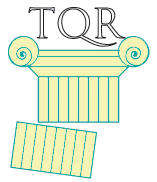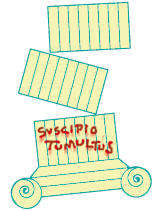Post by sturgeon on May 12, 2022 9:17:39 GMT
Hmm... Bulldust often starts these posts with a rant of moos. Being a fish creature, I have no reasonable equivalent. Except, maybe...
Blub blub blub.
Guh. That doesn't work at all. And neither does the opening paragraph of this latest cap.
It starts:
The second half of which is flabby and messy and a terrible first impression. The folder slides off the desk, and "one" the way it knocks over a picture, and, and... it's like a clumsy play-by-play. Some economy of words would help:
However, the rest of the cap was better. Blunt, perhaps, but charming.
It tells of a future world in which civil servant Rob is hired to judge whether those living on the fringes of society are worthy of extermination, much like Red Dwarf's Inquisitor. He is given a case that, to him, seems cut-and-dried in favour of allowing the subject to live, and is shaken when the authorities are less certain - applying principles that make him question the objectivity of the whole enterprise.
I like the subtle implication that as a junior examiner he got the morally black-and-white cases, and only now as a senior examiner is he privy to the inevitable overreach of ivory-tower government departments that make life-or-death social welfare decisions based on reports created using Google Forms.
The title is clever, harking back to Socrates' defence against thoughtless application of legal and cultural generalisations. And I appreciate that the plot did not take the most obvious and most dystopian route.
What I'm trying to say is, despite this cap being... a little shallow... it was fun. I enjoyed it. Enough to forgive its imperfections.
I vote Live.
Blub blub blub.
Guh. That doesn't work at all. And neither does the opening paragraph of this latest cap.
It starts:
“So, you gonna kill this bastard?”
Harvey leaned against the door frame of Rob’s office. A coffee cup hung lazily from his left hand. Rob’s boss tossed the file onto his desk. The packed manila folder slid off the desk onto Rob’s lap. One the way, it knocked over the picture of his fiancée, Jessica, which Rob set up again.
“I assume this is a tough case?” Rob asked, grabbing the file the first time.
Harvey leaned against the door frame of Rob’s office. A coffee cup hung lazily from his left hand. Rob’s boss tossed the file onto his desk. The packed manila folder slid off the desk onto Rob’s lap. One the way, it knocked over the picture of his fiancée, Jessica, which Rob set up again.
“I assume this is a tough case?” Rob asked, grabbing the file the first time.
The second half of which is flabby and messy and a terrible first impression. The folder slides off the desk, and "one" the way it knocks over a picture, and, and... it's like a clumsy play-by-play. Some economy of words would help:
“So, you gonna kill this bastard?”
Harvey leaned against the door frame of Rob’s office. A coffee cup hung lazily from his left hand. Rob’s boss tossed the file onto his desk. It knocked over the picture of his fiancée, Jessica.
“I assume this is a tough case?” Rob asked, setting the picture upright.
Harvey leaned against the door frame of Rob’s office. A coffee cup hung lazily from his left hand. Rob’s boss tossed the file onto his desk. It knocked over the picture of his fiancée, Jessica.
“I assume this is a tough case?” Rob asked, setting the picture upright.
However, the rest of the cap was better. Blunt, perhaps, but charming.
It tells of a future world in which civil servant Rob is hired to judge whether those living on the fringes of society are worthy of extermination, much like Red Dwarf's Inquisitor. He is given a case that, to him, seems cut-and-dried in favour of allowing the subject to live, and is shaken when the authorities are less certain - applying principles that make him question the objectivity of the whole enterprise.
I like the subtle implication that as a junior examiner he got the morally black-and-white cases, and only now as a senior examiner is he privy to the inevitable overreach of ivory-tower government departments that make life-or-death social welfare decisions based on reports created using Google Forms.
The title is clever, harking back to Socrates' defence against thoughtless application of legal and cultural generalisations. And I appreciate that the plot did not take the most obvious and most dystopian route.
What I'm trying to say is, despite this cap being... a little shallow... it was fun. I enjoyed it. Enough to forgive its imperfections.
I vote Live.



